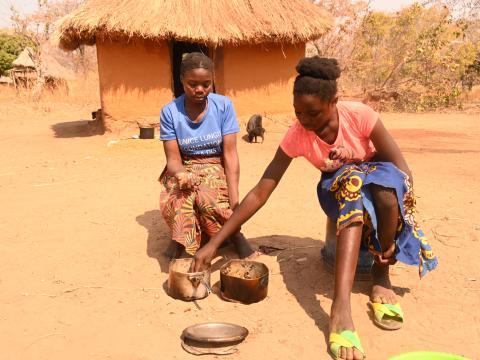Estella's Struggle for Survival Amidst El Niño Drought

By Christabel Mundike, Communications, Zambia
Over nine million Zambians are estimated to be affected by the El Nino drought, worsening the country’s challenges. The El Nino resulted in severe drought conditions across much of the nation, leading to widespread crop failures and severe water shortages. Rural communities, already grappling with limited resources, are now facing heightened food insecurity and reduced access to clean water.
Among those most hit is Estella Phiri, a widow from Nyimba District. The relentless drought has deprived her fields of the essential rains needed to nourish her crops, leaving them parched and barren. What was anticipated to be a year of potential abundance has instead turned into a year of misery.
Facing the weight of her new reality, Estella spoke with sadness, saying, "The maize was meant to be our future, a promise of something better. And now, with my grandmother gone, I don’t know what to do. I never thought I'd be on my own. The financial strain is huge for me to bear alone.”
The loss of her grandmother has been a huge blow. Estella feels as though she has lost a part of herself.
With seven children depending on her, Estella Phiri has faced some of the most difficult decisions of her life. The drought has left her struggling to provide even the most basic necessities for her family.
In an effort to ensure that at least one of her children might have a better chance at a more stable life, she made the tough decision to send one of her children to live with her sister.
This choice was not made lightly. "I had to make the hardest choice of my life," Estella reflects with tears. "Sending my child away was painful, but I had to think about their future, even if it meant tearing apart my own heart. By doing so, I wasn't just parting with a beloved family member; I was also acknowledging my own inability to meet the growing needs of all my children."
For Estella, the separation was more than just a physical distance; it was an emotional and psychological burden.
"The drought has transformed what was once a hopeful year into hardship and uncertainty. As I look after the remaining six children, I struggle with a deep sense of loss and the worry for their well-being," she lamented.
Her children, who once dreamed of getting educated and a brighter future, now face a harsh reality. The lack of funds for basic necessities like school supplies means that their education is a distant dream. They spend their days at home, their potential unrealized, and their futures uncertain.
Meals in Estella’s home have become a rare comfort. The family survives on leftover nshima and vegetables. Estella’s small-scale entrepreneurship—buying mealie meals to make and sell Munkoyo (a locally brewed drink)—provides only intermittent relief.
"Every day, I try to make something out of nothing," she says. "But the income is so unpredictable that it often feels like I’m barely keeping us afloat."
The sight of her children’s hunger is a constant source of anguish.
"Every day is a battle," she admits. "I had hoped this year would be different, but the drought took that hope away. Now, I only think about where the next meal will come from. Sometimes, I stay inside, unable to face the hunger in my children’s eyes. It breaks my heart."
While immediate relief efforts are helping to mitigate some of the impacts of El Niño, families like Estella's continue to face significant hardships. Addressing the root causes and building long-term resilience is crucial for Zambia’s recovery and future preparedness.